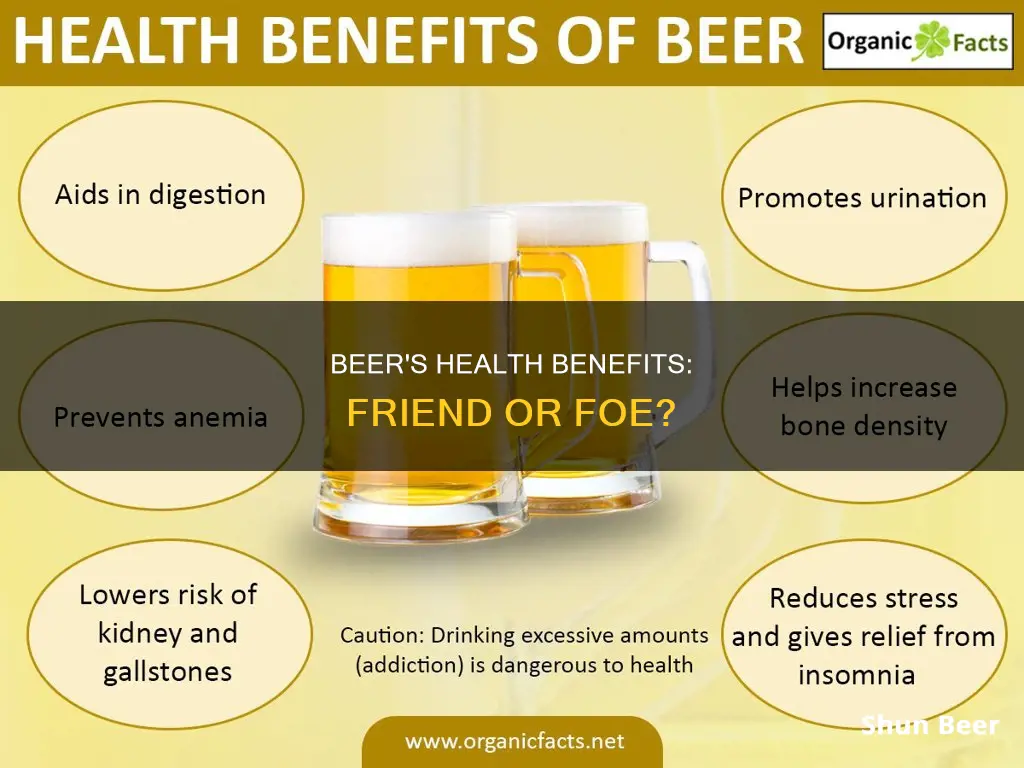
Beer is one of the oldest beverages in the world, with recipes found in Egyptian tombs, Mesopotamian archaeological sites, and Babylonian texts. Today, it is consumed globally and is often associated with socialising and relaxation. But is beer healthy for you?
Beer has been the subject of numerous health studies, with evidence suggesting that it may offer certain health benefits when consumed in moderation. These potential benefits include a reduced risk of heart disease, improved blood sugar control, stronger bones, and a lower risk of dementia. Additionally, beer is a source of various B vitamins, minerals, and antioxidants, which can contribute to overall health.
However, excessive beer consumption can lead to negative health consequences. Heavy drinking is associated with an increased risk of weight gain, liver disease, certain types of cancer, cardiovascular disease, and depression, among other health issues. It is important to note that the health effects of drinking beer are mixed, and excessive consumption can negate any potential benefits.
So, while moderate beer intake may provide some health advantages, it is crucial to consume it responsibly and in conjunction with a balanced diet and healthy lifestyle.
| Characteristics | Values |
|---|---|
| Positive health effects | Decreased risk of heart disease, osteoporosis, type 2 diabetes, neurodegenerative diseases, and dementia |
| Nutritional value | Vitamins B1, B2, B3, B5, B12, fibre, potassium, calcium, thiamine, iron, zinc, antioxidants, and amino acids |
| Negative health effects | Increased risk of cancer, liver disease, cardiovascular disease, neuropsychiatric diseases, addiction, depression, weight gain, intestinal inflammation, and leaky gut syndrome |
What You'll Learn

Beer and heart health
The Potential Benefits of Moderate Beer Consumption on Heart Health:
Moderate beer consumption, typically defined as one drink per day for women and one to two drinks per day for men, has been linked to a decreased risk of heart disease and improved heart health. Some studies suggest that light to moderate drinking may:
- Increase "good" HDL cholesterol levels: Beer can slightly raise high-density lipoprotein (HDL) cholesterol levels, which is associated with improved heart health.
- Prevent blood clotting: Alcohol has an anti-clotting effect, which may reduce the risk of heart attacks. However, it's important to note that this can also increase the risk of bleeding.
- Protect against damage from "bad" LDL cholesterol: Beer may help prevent the damage caused by low-density lipoprotein (LDL) cholesterol, which is a risk factor for heart disease.
The Potential Risks of Excessive Beer Consumption on Heart Health:
Excessive or heavy drinking is defined as consuming more than the recommended moderate amounts. It can lead to serious negative health consequences, including an increased risk of heart-related issues:
- Cardiovascular disease: Excessive drinking is a risk factor for cardiovascular disease, which can include conditions affecting the heart and blood vessels.
- High blood pressure: Regular or high alcohol consumption can lead to increased blood pressure, which is a major risk factor for heart disease.
- Heart muscle diseases: Prolonged heavy drinking can contribute to diseases of the heart muscle, known as cardiomyopathy.
- Irregular heart rhythms: Binge drinking, which involves consuming a large amount of alcohol in a short period, can cause arrhythmias or irregular heart rhythms.
Factors to Consider:
It is important to note that the positive effects of moderate beer consumption on heart health may be influenced by other factors, such as lifestyle choices and dietary habits. Additionally, the potential benefits of beer consumption do not outweigh the risks associated with excessive drinking. Heavy drinking can lead to a range of negative health outcomes, including liver disease, cancer, and other serious conditions. Therefore, it is crucial to consume beer in moderation and prioritize a healthy lifestyle with regular exercise and a balanced diet.
Bourbon vs Beer: Which Alcoholic Drink is Healthier?
You may want to see also

Beer and bone density
Beer has been linked to increased bone density in both men and women, according to a 2021 review published in Nutrients. The review also found that consuming one beer per week was associated with a lower risk of hip fracture. However, the review called for more research to support these findings and to evaluate whether the benefits of beer consumption outweigh the potential negative effects on health.
Some studies have found a positive association between moderate alcohol consumption and bone density in older women, but the mechanism behind this effect is not yet well understood. One hypothesis is that alcohol affects adrenal androgens or estrogen concentrations, which may be more significant in postmenopausal women and men than in premenopausal women due to their lower estrogen levels. Another hypothesis suggests that the primary effect of moderate ethanol ingestion is the acute suppression of bone resorption rather than an alcohol-hormone-bone pathway.
A study published in the American Journal of Clinical Nutrition in 2009 found that moderate consumption of alcohol, specifically beer, may be beneficial to bone health in men and postmenopausal women. The study included 1,697 healthy women of whom 710 were premenopausal, 176 were perimenopausal, and 811 were postmenopausal. The results suggested that beer intake was associated with a significant increase in bone density.
Another study published in the Journal of Bone and Mineral Research in 2004 found that dietary silicon intake was positively associated with bone mineral density in men and premenopausal women. Silicon is a major constituent of beer, and its ingestion has been found to stimulate human osteoblasts and osteoblast-like cells, which are involved in bone cell maturation and bone formation.
However, it is important to note that excessive alcohol consumption is associated with a higher risk of osteoporotic fractures and an imbalance in bone remodeling, which can lead to bone loss. Therefore, while moderate beer consumption may have some beneficial effects on bone density, excessive drinking can have negative consequences for bone health.
Whisky vs Beer: Which Booze is Better for Your Health?
You may want to see also

Beer and diabetes
Beer is a significant source of carbohydrates, so drinking it can impact blood sugar levels. Beer and sweet wine contain carbohydrates and may raise blood sugar. Beer is also typically higher in carbs than other alcoholic drinks like wine or liquor. However, the carb content of beers can vary widely depending on the type of beer. For example, "light" beers have the fewest carbs, usually 5 or fewer grams per serving. They are also lower in alcohol content. Hoppy craft beers like IPAs and stouts tend to be much higher in carbs, usually containing 15 grams or more per serving. They also tend to be higher in calories and alcohol.
According to the ADA, because the liver prioritizes clearing alcohol from the body, drinking alcohol can slow down carb metabolism, potentially leading to low blood sugar (hypoglycemia). If you are on insulin or other anti-hyperglycemic medications, this can lead to dangerously low blood sugar up to 24 hours after you stop drinking. Alcohol can also cloud your judgment, so you may not realize that your blood sugar is low.
Moderate drinking (no more than one to two drinks a day) may be beneficial for people with diabetes. However, there are some important safety considerations. To avoid hypoglycemia, don’t drink on an empty stomach and check your blood sugar often while drinking and up to 24 hours after you stop drinking.
If you are going to consume alcohol, it's a good idea to consume it with food. This will be better for your blood sugar than drinking on an empty stomach. Be sure to stay hydrated by drinking water with your beer, too.
Beer's Heart Health Benefits: Fact or Fiction?
You may want to see also

Beer and mental health
Beer, like any other alcoholic beverage, can be a double-edged sword when it comes to mental health. On the one hand, moderate consumption of beer has been linked to improved mental health and well-being. A study by Antonio Moreno-Llamas et al. in 2023 found that compared to abstainers, occasional and moderate beer drinkers reported better mental health, self-perceived health, and social support. This is supported by other studies that suggest light to moderate beer consumption may have positive effects on mental health, including a reduced risk of neurodegenerative diseases such as Alzheimer's disease.
On the other hand, excessive beer consumption can negatively impact mental health. Alcohol can affect the brain's communication pathways and its ability to process information, leading to impaired memory, sleep, and reflexes. Additionally, heavy drinking is associated with an increased risk of mental health problems and can exacerbate existing mental health issues. Research shows that people with severe mental illness are more likely to have alcohol problems, possibly due to self-medication. Regular heavy drinking is also linked to symptoms of depression, and alcohol can worsen depression and increase the side effects of antidepressants.
While moderate beer consumption may have some benefits for mental health, excessive consumption can have detrimental effects. It is important to consume beer in moderation and be mindful of the potential risks associated with heavy drinking.
Hard Cider vs Beer: Which Is Healthier?
You may want to see also

Beer and gut health
Beer is one of the most widely consumed alcoholic beverages in the world, and its potential health benefits have been the subject of much research. While excessive consumption of alcohol can lead to negative health outcomes, light to moderate beer consumption may offer some health benefits, including a reduced risk of certain diseases.
One area of interest is the impact of beer consumption on gut health. Beer contains polyphenols, which are plant-based chemical compounds known to interact with the gut microbiota. These polyphenols, derived mostly from malt and hops, include ferulic acid, xanthohumol, catechins, epicatechins, proanthocyanidins, quercetin, and rutin.
Research suggests that these polyphenols may have a positive impact on gut health. A 2022 randomised, double-blind, controlled trial found that daily consumption of 330ml of non-alcoholic or alcoholic beer for four weeks increased gut microbiota diversity, which has been associated with positive health outcomes. The study also found a tendency for beer to increase faecal alkaline phosphatase activity, a marker of intestinal barrier function.
Another study, published in 2019, focused on the relationship between beer polyphenols and gut microbiota, specifically examining the health outcomes. The authors suggested that the interaction between polyphenols in beer and gut microbiota could play a significant role in the health benefits attributed to moderate beer consumption. They found that moderate beer consumption was associated with a proliferation of Bacteroidetes, which has been linked to improved fasting blood serum glucose levels and increased functional beta cells.
However, it is important to note that excessive alcohol consumption can negatively impact gut health. Alcohol can irritate the small intestine and colon, affecting the normal speed of food movement, which may result in abdominal pain, bloating, and diarrhoea. Additionally, alcohol can alter the bacteria in the gut, making the body more susceptible to alcohol-related diseases, including alcoholic fatty liver disease.
While moderate beer consumption may offer some benefits to gut health, excessive consumption can lead to negative health consequences. As with all alcohol, it is essential to consume beer in moderation and prioritise a healthy lifestyle that includes a balanced diet and regular exercise.
Beer and Diabetes: What's the Verdict?
You may want to see also







